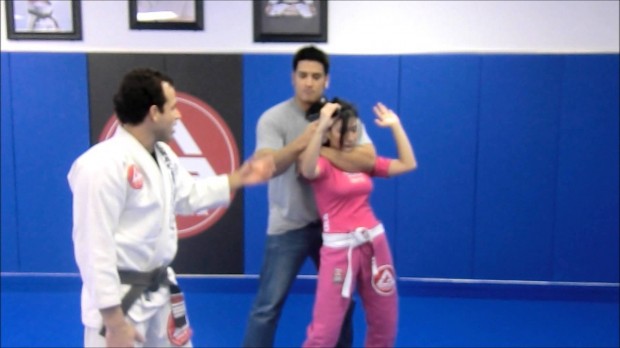On Self-Defense: A Follow-Up

Greetings! After my last article “A Word on Self-Defense” I felt it prudent to write a follow-up because, looking back, I realized a few things were left out. Today I’d like to go into a Before-During-After breakdown to round everything out. That said, let’s get right into it.
Before An Altercation
In the closing paragraphs of my last piece I mentioned consulting an attorney who specialized in self-defense laws to help you better understand the when’s, where’s, and how’s of legally defending yourself. Here is a little food for thought for your consultation.
1.) Inquire on the legal difference between defending yourself with strikes (punches, kicks, elbows, knees, even head-butts) as opposed to grappling (takedowns, throws, joint locks, and chokeholds). It may seem trivial, but sometimes laws differentiate in severity between punches and kicks, as well as other techniques. It’s best to know how far you are legally allowed to go.
2.) Ask about proper behavior during an arrest. What should you say or do? Years ago I asked about this and received a very simple, yet prudent piece of advice: Cooperate with the authorities but do not make a statement. You have the right to remain silent, so use it and don’t incriminate yourself. If the police press you, tell them that you would prefer not to make a statement at the moment, or without your attorney. The reason for this is because in the immediate aftermath of a physical confrontation your body is still trying to process a massive adrenaline dump. You will be excitable, anxious, and the events details will be fuzzy. When you are calm you will be able to better recall what happened. If you make a statement at the scene and then later on remember something different it will seem as if you were being dishonest.
These have nothing to do with legalities, yet they are very important considerations for the Before part of an altercation.
–Do you absolutely, positively have to fight? Can you defuse the situation verbally? Can you simply leave, or even run away? Even if you are only a semi-serious martial artist in decent physical shape, then flight should be as easy as fighting. Running accomplishes two things: A.) It helps to break the will of the attacker; he’s less likely to want to fight if he has to run a mile to do it. B.) It tires the attacker out if he does catch you, making him easier to dispatch. Also if he chases you, it’s much easier in court to justify your use of force. Despite many opinions, there is nothing cowardly about leaving an area in favor of another that is more suitable to your defense. Miyamoto Musashi mentions this in the Book of Five Rings. Musashi was arguably the greatest samurai of all times, so I don’t take his advice lightly. But it isn’t just ancient wisdom; tactically it’s a smart move. Your attacker may prefer this place because it suits his purposes and puts you at a disadvantage. Losing that advantage may cause him to break off his attack.
–Is there a possibility of multiple attackers? No matter how good of a fighter you may be, engaging more than one opponent at a time is risky. You will get hurt. No exceptions.
–Will my attacker(s) be armed? I’m exceptionally wary of this because here in Texas so many people carry pocket-knives and, though it’s rare, it’s not unheard of that they are drawn in an altercation. Knife-fighting, like BJJ, requires the attacker to get very up-close and personal. You are either playing into his hands or he is playing into yours. Neither of you is at an advantage and you are very likely to be cut or stabbed. It boils down to who slips up first. Remember, when weapons come out people die. Simple as that.
–Bodily injuries. Make no mistake; in a street-fight you will get injured. The question is how serious. Can you afford to miss work due to injury? Can you afford medical treatment if you need it?
–Lastly, in a street-fight the deck is always stacked against you. The late Edgar Sulite once said ‘If I’m better than my opponent, he dies. If he’s better than me, I die. If we’re the same, we both die.’ One in three are terrible odds.
During an Altercation
This one should be obvious but it bears repeating. Assuming that you have done everything in your power to avoid it (leaving, defusing, etc.), if your only option is to fight, then you need to act quickly and decisively. Be aggressive and do not hesitate. Remember, however, not to go past the point of self-defense. This should be no problem if you’ve consulted an attorney and are aware of your rights.
After the Altercation
If you settle the issue without law enforcements involvement, leave quickly and quietly. If law enforcement is involved, cooperate with them. If you have to speak to them, brevity is the best policy. Remember, you aren’t there to make their job harder; you just don’t want to incriminate yourself. If you are arrested don’t worry, bond out and consult your attorney.
Conclusion
Fighting is chaotic and it gets out of hand quickly. Before you know it you can find yourself in very deep water. Knowing the law can help you tread that water. Please don’t be the crazy guy who ignores the law because he believes it violates the sacredness of his ancient combat art. In the eyes of the law this guy is no better than a criminal. If you are like this, then you are playing a dangerous game and fighting a losing legal battle. Make a change. Educate yourself. If not you could end up in prison or, worse yet, the cemetery. Remember, there are no games without rules and no wars without casualties.
Contributing Author
Caston Nathaniel
Purple Belt, Gracie Barra Clear Lake Texas
